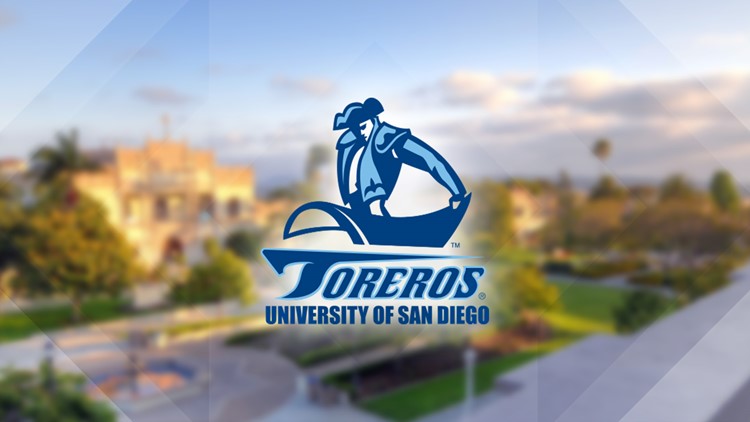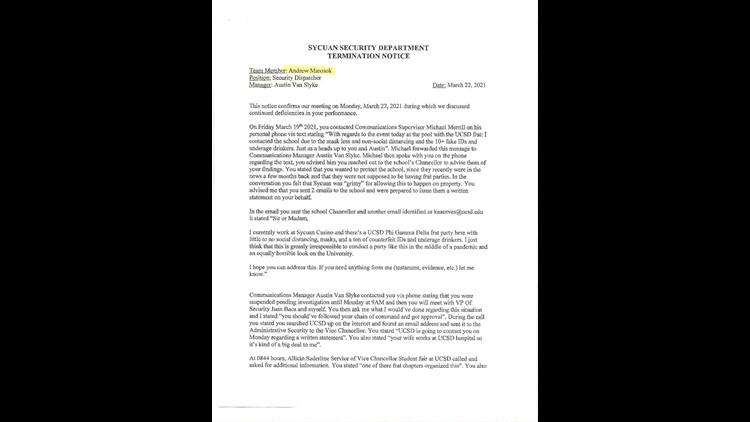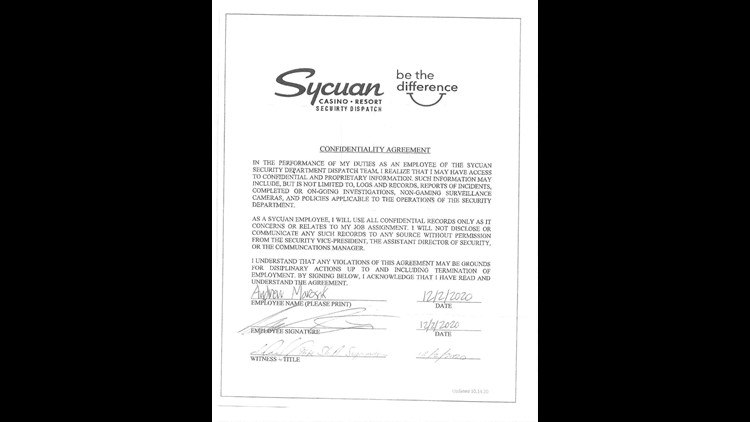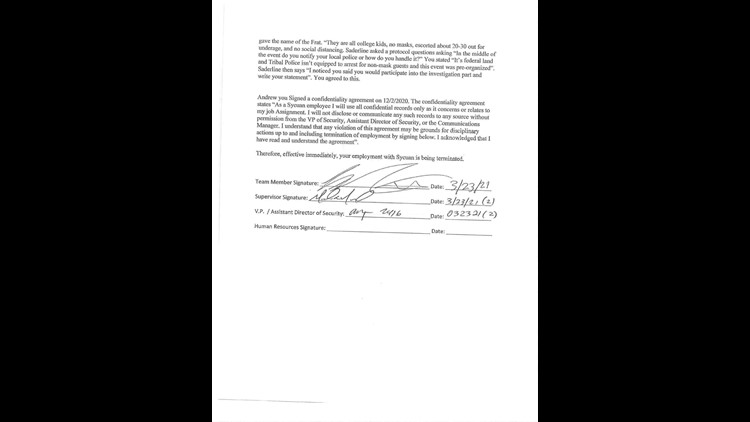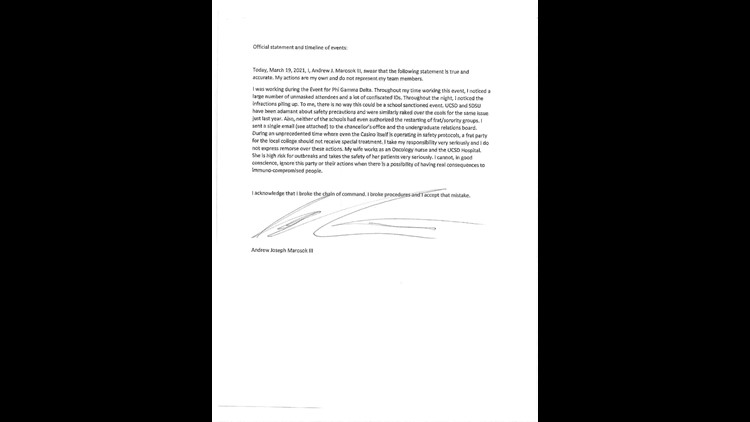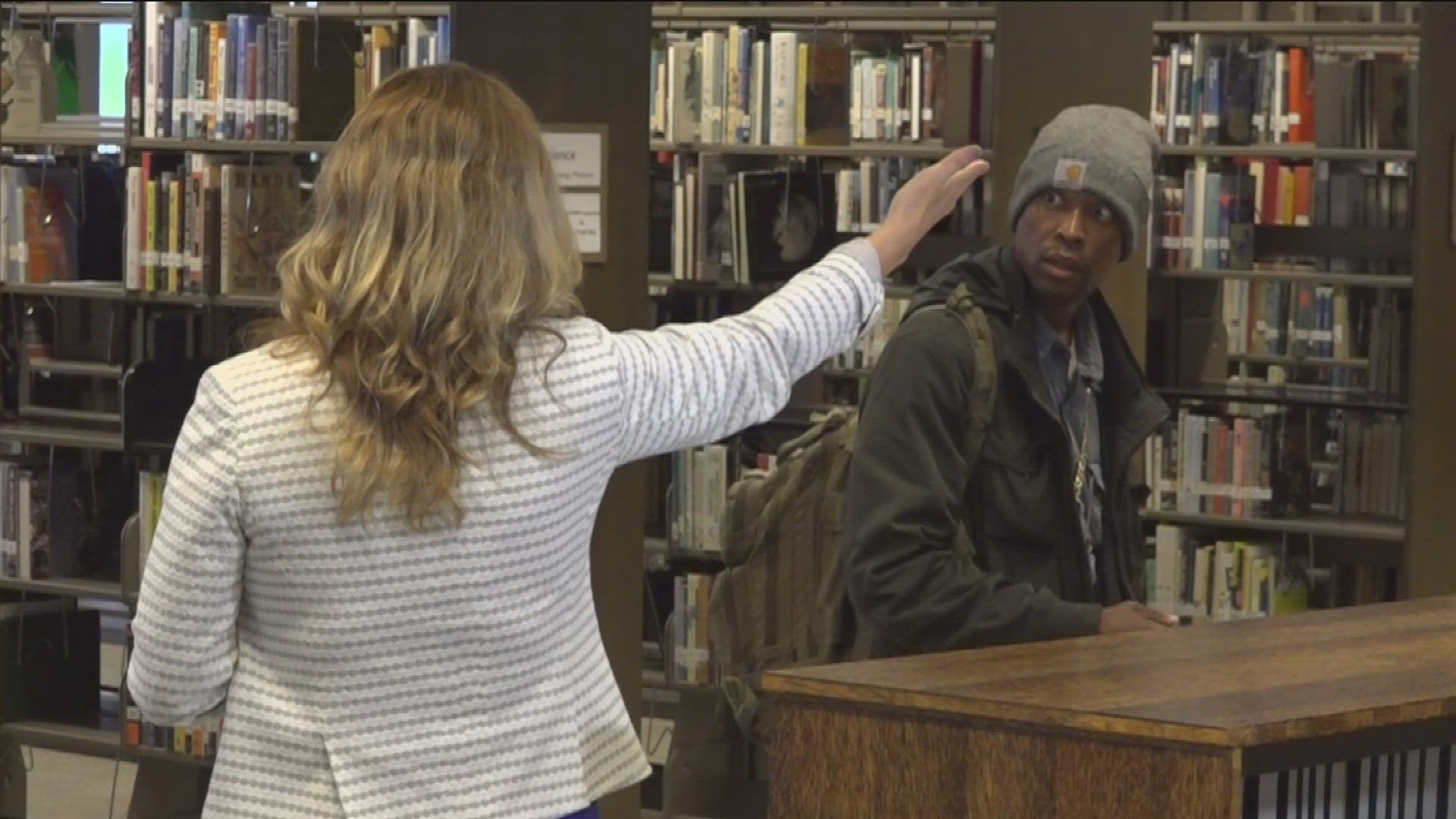SAN DIEGO COUNTY, Calif. — Story Update (July 2021): University of San Diego reported six violations against the fraternity, confirming its presence on the night of the Sycuan Casino pool party. The most recent story can be found here.
University of San Diego is investigating its Phi Gamma Delta fraternity after a large, unmasked party at Sycuan Casino in March, according to a former employee who worked the event. Around 20 fake IDs were confiscated.
The former employee, Andrew Marosok, originally reported the event to UC San Diego the night of the party on Friday, March 19. News 8 later discovered the fraternity belongs to USD. He was fired the next Monday, according to documents obtained by News 8.
Sycuan Casino maintains that Marosok broke his confidentiality contract, stating he was required to report to his managers before informing the university.
In emails obtained by News 8, Sycuan Casino was planning to host around 85 members of UC San Diego's Phi Gamma Delta fraternity at its pool deck, commonly referred to as FIJI.
Emails show FIJI lied about how many underage people were attending the casino event. Security detail also wrongfully labeled the fraternity as UCSD's chapter.
Around 20 fake IDs from fraternity members were confiscated by security guards, according to Adam Day, the chief administrative officer for the Sycuan Band of the Kumeyaay Nation.
"The IDs were confiscated and the patrons were escorted off property, as our regulations do not allow anyone under the age of 21 inside the casino," Day said in an email.
Day said underage guests are allowed on Sycuan's grounds on very rare occasions.
FIJI first told Sycuan 20 of their guests were underage. Sycuan agreed and set up certain measures to separate those 21 and older. This included wristbands, different points of entry and exit for those underage, according to security plans obtained by News 8.
The frat later informed Alberto Hollman, the casino's catering sales manager, that only one of their members was underage. This turned out to be false, and the brothers with fake IDs were escorted off the property, according to Day.
Sycuan's pool retreat webpage and security details obtained by News 8 show that masks and social distancing are required efforts that must be maintained by patrons and employees. Marosok, who worked the event, said this was not the case the night of the party.
"It pretty much looked pre-pandemic," Marosok said. "Like a party you would see pre-pandemic. Talking with no masks, drinking and just having a grand old time."
Sycuan Casino denied multiple requests for interviews about the details of the event or how such a large fraternity party was allowed during a global pandemic. The casino referred numerous times back to the original statement made by Day.
"We are not in the practice of identifying by name or association the private events we host on property, so I am not in a position to confirm or deny who or what the event was or for," the statement said.
Marosok broke his confidentiality to report this party where many fake IDs were confiscated, and many coronavirus safety protocols set by the casino were reportedly broken.
Why would he jeopardize his job to report these alleged coronavirus violations?
Andrew Marosok was with Sycuan Casino for just three months before willingly breaching his confidentiality agreement to report the party.
The veteran worked as a security dispatcher. He told News 8 that he viewed the lack of social distancing and masks through the security cameras in the office he worked in.
Marosok, who was mistakenly under the impression this fraternity belonged to UCSD, feared for his safety in regards to COVID-19 spread.
"My wife works at the UCSD hospital as a nurse, she just started working there." Marosok said. "Because of how close the hospital and the campus are, there's always going to be a potential of crossbreed germs there and a possibility of her getting infected."
"Being in the casino where I have to sanitize my desk twice a day... we have to wear masks constantly when we're in our offices... we have to do all these other precautions around the casino but they can just have that party," Marosok said.
Marosok's concern came as Sycuan Casino reported the second-highest rate of coronavirus infections out of San Diego County's seven casinos throughout 2020.
From June 2020 to December, Sycuan reported 155 cases of the virus, second highest to Viejas with 166, according to KPBS.

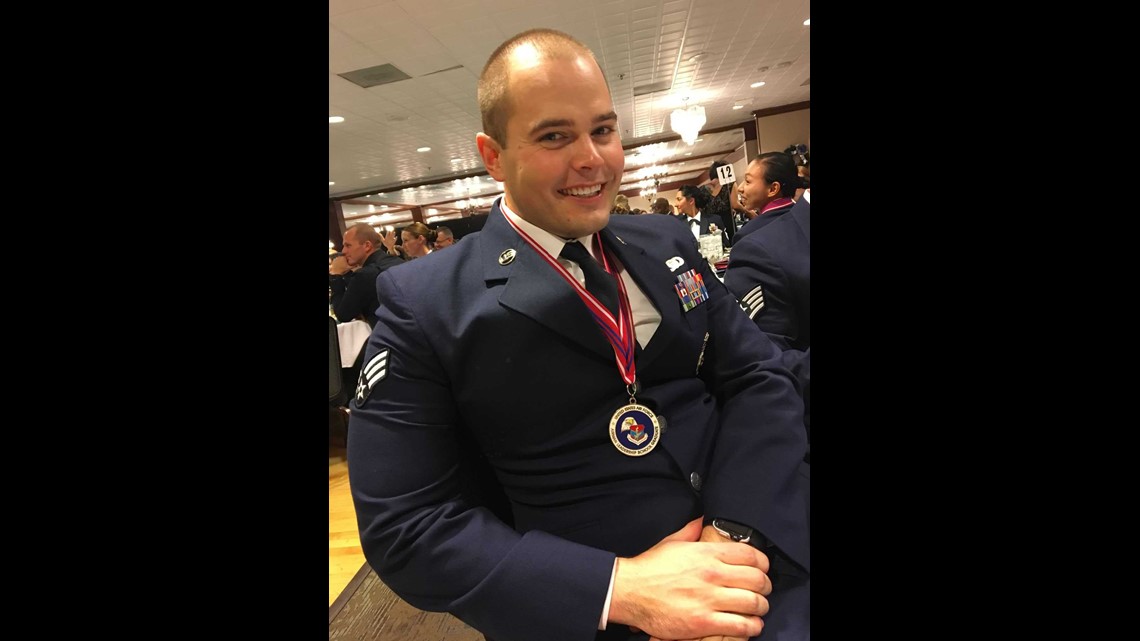
On the night of the 19, Marosok sent the following email:
“I currently work at Sycuan Casino and there’s a UCSD Phi Gamma Delta frat party here with little to no social distancing, masks, and a ton of counterfeit IDs and underage drinkers. I just think that this is grossly irresponsible to conduct a party like this in the middle of a pandemic and an equally horrible look on the University,” his message stated.

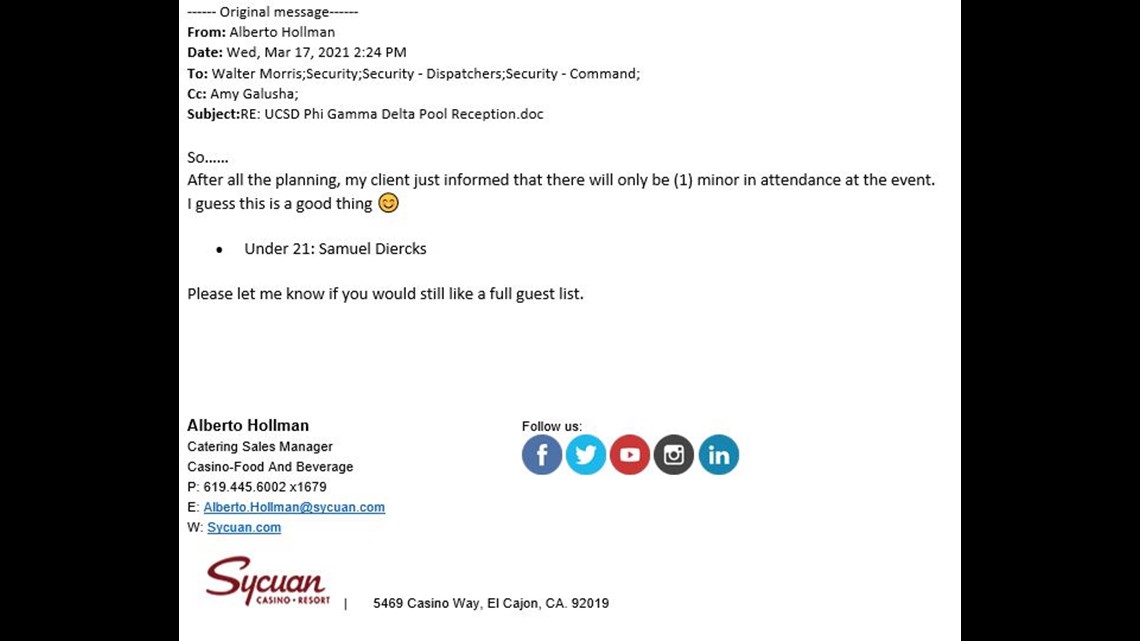
Marosok told his direct reports he reported the event and was immediately suspended the same night.
That following Monday he met with Austin Van Slyke, the security communications manager, where he was terminated for breaching his confidentiality contract.
"My dispatch coworkers are in a spot where they kind of need the job," Marosok said. "I'm not in a make or break position where I have to kind of ignore or lie about things to keep a job."
Marosok said he expected consequences because he used his work email to email the school, but took it as a calculated risk to report the party.
"I'm prior military, so I looked at kind of the totality of circumstances and I said 'Yeah, this is worth putting your neck on the line.'"
Fraternity confusion: which school was it?
When News 8 asked about the fraternity party back in March, UCSD University Communications Assistant Director Erika Johnson said an investigation into its FIJI chapter was conducted and found that none of the students involved in the Sycuan Casino party were part of the school.
Johnson said the school told Sycuan's security department to look into University of San Diego.
USD declined multiple requests for interviews with Fraternity and Sorority Life (FSL) investigators looking into FIJI’s violations, but they did confirm to News 8 that its fraternity is being reviewed for misconduct related to the casino event.
According to emails sent by Ryan Hansen, USD's investigations sergeant with the Department of Public Safety, the school started its investigation on April 8.
“The incident has also been elevated to the Office of Ethical Development and Restorative Practices, which reviews student code of conduct violations,” USD said in an email.
FIJI violated USD’s student code of conduct before on a number of counts. In October of 2019, it was found to have violated five of them. All of the previous violations had to do with unsanctioned events without leadership or school approval. And there may have been alcohol involved, according to the violation descriptions.
The FSL website for USD shows the date that FIJI was investigated back in 2019, but does not display a summary of events or the Student Code of Conduct violations found.
Lissette Martinez, senior director of media relations with USD, provided those violations to News 8 in an email. They are Section 2, A.1.b., Section 2.A.3., Section 2.A.8., Section 3.B., Section 3.C.2-3.
It is not known what FIJI is being investigated for right now for the Sycuan Casino party. It is also unknown what penalties FIJI suffered back in 2019 for its five violations of conduct.
The national Phi Gamma Delta organization and USD's FIJI chapter did not respond to numerous requests for comment.
Former employee could have been protected by whistleblower laws
Marosok reported this large party because of alleged coronavirus violations, a potentially unsafe environment during the time of a pandemic.
Even though he violated his contract to report safety concerns, he is not protected by federal or state whistleblower laws. But according to Attorney Dante Pride, it brings up the question of whether these laws should be expanded during a global health crisis.
Section 1102.5 of the California Labor Code states that an employer can't retaliate against an employee if they report unsafe working conditions to government entities or law enforcement.
Marosok reported the violations to UCSD, which has no authority equal to government or law enforcement.
Pride said it's up for debate if Marosok can be protected or fight his termination in court.
"It's one of those situations where you kind of do have him reporting, you know, and you do have them absolutely retaliating against him, but whether or not it's legal retaliation is where we're going to draw that line where the fight's going to happen," Pride said.
Pride said this situation was arguable due to the unique authority the school has on the fraternity. One of them would be the fake IDs.
"There could be some type of discipline handed out by the school, therefore they are someone who could provide discipline, but the discipline would be to the kids and not to Sycuan," Pride said. So I don't know again if that would really qualify but it's arguable."
Pride said that due to a global pandemic, cases like Marosok's should apply under a retaliation setting if he was reporting out of fear for his health and safety.
"To the extent that he was scared and nervous about that and called and told the school about that, retaliation should encompass that they shouldn't be able to fire him or that because he was really afraid."
A representative from the Department of Labor said they couldn't offer specific comment on a potential case, but offered a statement that workers should feel confident in speaking up about health issues.
"An employer must keep a workplace free of known health and safety hazards," The statement said. "Employees have the right to speak up about hazards without fear of retaliation."
But Marosok did violate his confidentiality agreement, and his complaints may have come at the right time, but wrong place.
"I think it's just unfortunate that he decided to call the school and not the County," Pride said."
Marosok's Sycuan Casino termination letter
WATCH: Tribal casinos tighten protocols, cancel some events, but remain open during COVID-19 surge:


